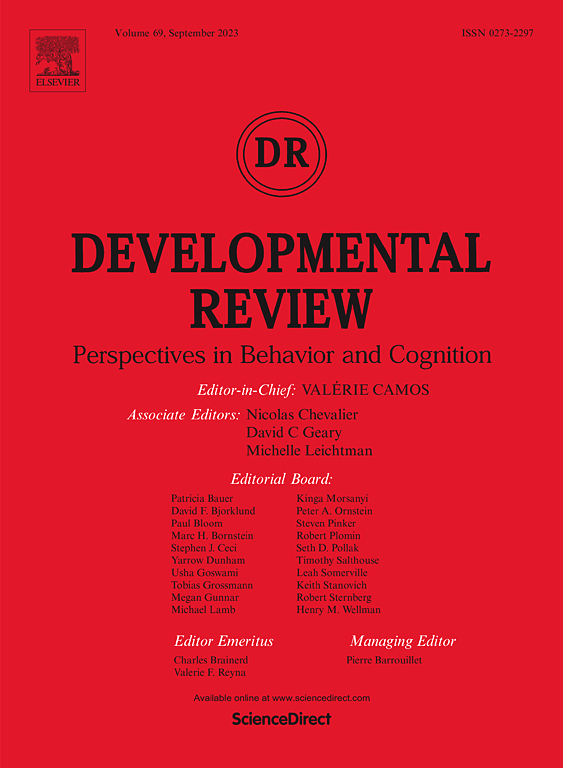Decoding the intent-to-outcome developmental shift in moral judgment, from infancy to preschool age: A critical review and a novel proposition
IF 5.6
1区 心理学
Q1 PSYCHOLOGY, DEVELOPMENTAL
引用次数: 0
Abstract
For decades, researchers in moral judgment development have described and tried to explain the so-called ‘outcome-to-intent shift’ that occurs by late preschool age: preschoolers predominantly base their moral judgments on the actions’ outcomes and it is only at the age of 5 or later that most children start to generate intent-based judgments. However, recent research in the domain of early moral development has reported intriguing findings: in their socio-moral evaluations, infants are sensitive to agents’ intentions and disregard information about the consequences of agents’ actions. What are the processes underlying this surprising developmental pattern? We first aim to critically review recent attempts to explain it which focus on the factors that impact infants’ and children’s sensitivity to information about intentions. We thus offer a review of the vast infant and child literature on the development of intent-based moral judgment. Next, we argue that current propositions explain a part of the findings, but they underestimate the importance of outcomes processing. By analyzing the factors that may influence the way children represent and react to outcomes, we offer a new proposition: a combination of developmental, experimental, cognitive and experiential factors determines a heightened sensitivity to outcomes in preschoolers, compared to other age groups. In addition to shedding new light on the understanding of the discrepancy between infants’ and children’s moral evaluations, the implications of this proposition for future developmental psychology research in the field of moral cognition are discussed.
解读从婴儿期到学龄前道德判断的意图到结果的发展转变:一个批判性的回顾和一个新颖的命题
几十年来,道德判断发展的研究人员一直在描述并试图解释所谓的“结果到意图的转变”,这种转变发生在学龄前后期:学龄前儿童的道德判断主要基于行为的结果,只有在5岁或更晚的时候,大多数孩子才开始产生基于意图的判断。然而,最近在早期道德发展领域的研究报告了有趣的发现:在他们的社会道德评估中,婴儿对代理人的意图很敏感,并且无视代理人行为后果的信息。这种令人惊讶的发展模式背后的过程是什么?我们首先旨在批判性地回顾最近的尝试来解释它,这些尝试集中在影响婴儿和儿童对意图信息敏感性的因素上。因此,我们提供了一个关于基于意图的道德判断发展的大量婴幼儿文献的回顾。接下来,我们认为当前的命题解释了部分发现,但他们低估了结果处理的重要性。通过分析可能影响儿童对结果的表现和反应方式的因素,我们提出了一个新的命题:与其他年龄组相比,发育、实验、认知和经验因素的结合决定了学龄前儿童对结果的高度敏感性。除了对婴儿和儿童道德评价差异的理解提供新的线索外,本文还讨论了这一命题对未来发展心理学在道德认知领域的研究的意义。
本文章由计算机程序翻译,如有差异,请以英文原文为准。
求助全文
约1分钟内获得全文
求助全文
来源期刊

Developmental Review
PSYCHOLOGY, DEVELOPMENTAL-
CiteScore
11.00
自引率
3.00%
发文量
27
审稿时长
51 days
期刊介绍:
Presenting research that bears on important conceptual issues in developmental psychology, Developmental Review: Perspectives in Behavior and Cognition provides child and developmental, child clinical, and educational psychologists with authoritative articles that reflect current thinking and cover significant scientific developments. The journal emphasizes human developmental processes and gives particular attention to issues relevant to child developmental psychology. The research concerns issues with important implications for the fields of pediatrics, psychiatry, and education, and increases the understanding of socialization processes.
 求助内容:
求助内容: 应助结果提醒方式:
应助结果提醒方式:


